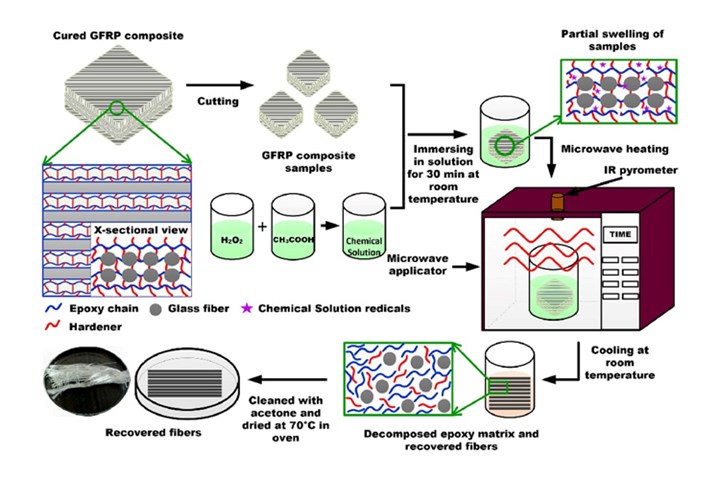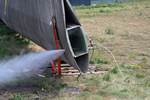IIT Mandi researchers use microwaves, eco-friendly chemicals to recover glass fibers
Development of a rapid, sustainable microwave-assisted chemical recycling process targets decommissioned wind turbine blades, promotes decreased landfill disposal.

Description of the process using microwaves to recycle fiber-reinforced polymer (FRP) composites. Photo Credit: ITT Mandi
Researchers at the (ITT Mandi, Mandi, India) have used microwaves to recycle fiber-reinforced polymer (FRP) composites from decommissioned wind turbine blades. The developed method is reported to be more rapid, sustainable and eco-friendly compared to methods currently used such as landfills and thermal-based recycling.
The research has been led by Dr. Sunny Zafar, assistant professor, School of Mechanical and Materials Engineering along with Dr. Venkata Krishnan, associate professor, School of Chemical Sciences, IIT Mandi and coauthored by their students Manjeet Rani and Priyanka Choudhary. Research findings, “,” have been published in the Resources, Conservation and Recycling Journal.
“We have developed a sustainable microwave-assisted chemical recycling [MACR] process to recycle glass fiber-reinforced polymer [GFRP] composite waste,” Dr. Sunny Zafar says. “Also, we used microwaves to aid the chemical degradation of GFRP composites with hydrogen peroxide and acetic acid. Both hydrogen peroxide and acetic acid are eco-friendly chemicals, the former used extensively as a disinfectant/antibiotic and the latter being vinegar.”
At the end of their service life, decommissioned glass fiber-reinforced epoxy wind blades are demolished and either landfilled or incinerated. Both methods of disposal add to environmental pollution and cost. It is predicted that about 200,000 tons of composite waste will be generated by wind turbine blades between 2024 and 2034 all over the world. According to researchers, this negates the environmental benefits offered by wind energy. Moreover, restrictions on landfill disposal and fluctuating raw material costs could increase the costs of these composite materials.
When talking about benefits of the research, Dr. Venkata Krishnan explains, “The recycling method that we have developed can lead to a profound shift in recycling technologies, which can help the country move towards a circular economy for wind turbine blades.”
Using their rapid, eco-friendly method to recycle the present fibers, the ITT Mandi team found that the decomposition rate of epoxy was 97.2% with recovery of the glass fibers. The recovered fibers were tested, and their properties were compared to those of virgin fibers — recovered fibers are reported to have retained nearly 99% of their strength and greater than 90% of other mechanical properties as compared to the virgin fibers.
Related Content
-
Cutting 100 pounds, certification time for the X-59 nose cone
Swift Engineering used HyperX software to remove 100 pounds from 38-foot graphite/epoxy cored nose cone for X-59 supersonic aircraft.
-
Plant tour: Airbus, Illescas, Spain
Airbus’ Illescas facility, featuring highly automated composites processes for the A350 lower wing cover and one-piece Section 19 fuselage barrels, works toward production ramp-ups and next-generation aircraft.
-
Welding is not bonding
Discussion of the issues in our understanding of thermoplastic composite welded structures and certification of the latest materials and welding technologies for future airframes.






